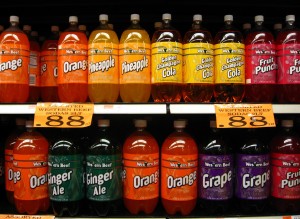
Last night the Richmond City Council voted to let the people decide. The Council instructed staff to prepare a ballot measure for next November to tax sugar-sweetened beverages, what most people call a "soda tax."
Richmond voters may have the chance to make their city the first in California, and one of the first in the country, to slap a special tax not just on sodas, but also sports drinks, energy drinks, fruit-flavored drinks and the like. 100 percent fruit juice and diet drinks would not be affected.
The goals are twofold. If the drinks cost more, people will drink fewer of them. Plus, taxes generate revenue, which the City Council says it would devote to new sports fields and other health programs. The motivation for the tax is childhood obesity. Wendel Brunner, Public Health Director of the Contra Costa Health Department walked people through the makings of what has become an epidemic.
- 32 percent of school children in Richmond are obese
- 24 percent of adults in Richmond are obese
- 11 percent of all deaths in Richmond are linked to obesity--obesity is shortening people's lives by years
So, what's the connection to sugar-sweetened beverages? It comes from Brunner's most jaw-dropping number: the average Richmond teenager who drinks sugary beverages every day consumes a whopping 150,000 calories a year--just from these sweetened drinks. That adds up to 20-30 pounds of additional weight over the year. As Brunner reported, it's those sweet drinks that are driving the obesity epidemic. "The thing about sugar-sweetened beverages is that the calories are insidious," he says, "so you consume a Big Gulp, you don't realize that you've drunk about 350 calories."
Harold Goldstein of the California Center for Public Health Advocacy agrees. "As mammals for the last 250 million years," Goldstein said, "we've consumed mother's milk and water. It turns out if you just drink sugar and water, our body doesn't notice it. ... Every time you drink soda, it's like having a little piece of chocolate cake, except if you ate the cake you'd be full, but if you drink the soda you won't be." And so you continue to eat. And then gain more weight.
Goldstein cites a study from UC Berkeley Center for Weight and Health which looked at average daily caloric consumption from 1977-2001 and found the average American was eating 278 more calories each day and almost half of those calories were from sweetened drinks. "The results were mind-blowing," he said, but added, "I realize in my adult lifetime, the beverage industry has changed dramatically. It used to be one little glass with ice. If you wanted more, you had to pay more. Every restaurant now provides free refills. What comes out of the vending machine has gone from 12 ounces to 20 ounces."
Which brings us back to Richmond and the soda tax coming on next year's ballot. People who spoke up at the meeting were divided. Richmond is a multi-ethnic city that suffers from a high crime rate. Many of the people live at or below the federal poverty level. Some people thought the tax would provide much needed funds for children's health programs; others argued the tax was regressive.
City Council member Jeff Ritterman was one of the sponsors of the tax proposal. He said this kind of bold move was needed. "It's sensible to send this to the voters and if voters vote it down, at least we will be able to talk about childhood obesity for many, many months until the election. We'll do something bold right now. Cautious isn't going to get us anywhere. Cautious is going to get us a 42 percent obesity rate."
The amount of the tax is under consideration but a penny per ounce is being discussed. Final ballot language will be considered in early 2012.